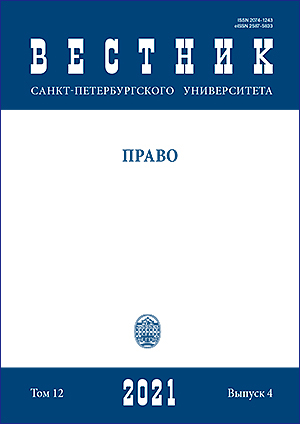Defendant’s bad faith as a basis for the court’s non-application of limitation of action
DOI:
https://doi.org/10.21638/spbu14.2021.415Abstract
The subject of this study is an analysis of possible changes to action limitation period norms of the Russian Civil Code in light of the introduction of good faith as a fundamental principle of the legal regulation of civil relations. The issue involves the non-application of limitation of action by courts as a result of the defendant’s actions that are incompatible with good faith. Since, on the one hand, limitation of action has been established in order to protect the defendant from untimely, belated, and sometimes unfair claims by the plaintiff, and, on the other hand, the defendant’s reference to omitting the statute of limitations completely deprives the plaintiff of the protection of his rights and legal interests violated by the defendant in bad faith. The goal of legal regulation is to find a solution that provides an optimal fair balance between the interests of the conflicting parties. In this regard, the authors propose a compromise model that presupposes the establishment of the degree of the defendant’s bad faith and, at the same time, takes into account the plaintiff ’s capability to file a lawsuit within the limitation period. The decisions of Russian courts on the refusal of courts to apply the limitation of actions due to the defendant’s bad faith are examined in this article. Also, the re-qualifying of a disputable transaction as void in consequence of the gross abuse of the right by the defendant is analyzed. Particular attention is paid to the mandatory nature of the Civil Code norms providing limitation of action: in order to protect the plaintiff from the defendant’s dishonest actions and to ensure uniformity of legal regulation meeting the interests of justice, it is proposed to legalize agreements on increasing the limitation period, taking into account, however, the need to protect the interests of the weaker party to the contract.
Keywords:
non-application of limitation of action, bad faith of the defendant, gross unfairness, agreements to increase the limitation period, estoppel, fair balance of parties’ interests
Downloads
References
Downloads
Published
How to Cite
Issue
Section
License
Articles of "Vestnik of Saint Petersburg University. Law" are open access distributed under the terms of the License Agreement with Saint Petersburg State University, which permits to the authors unrestricted distribution and self-archiving free of charge.






